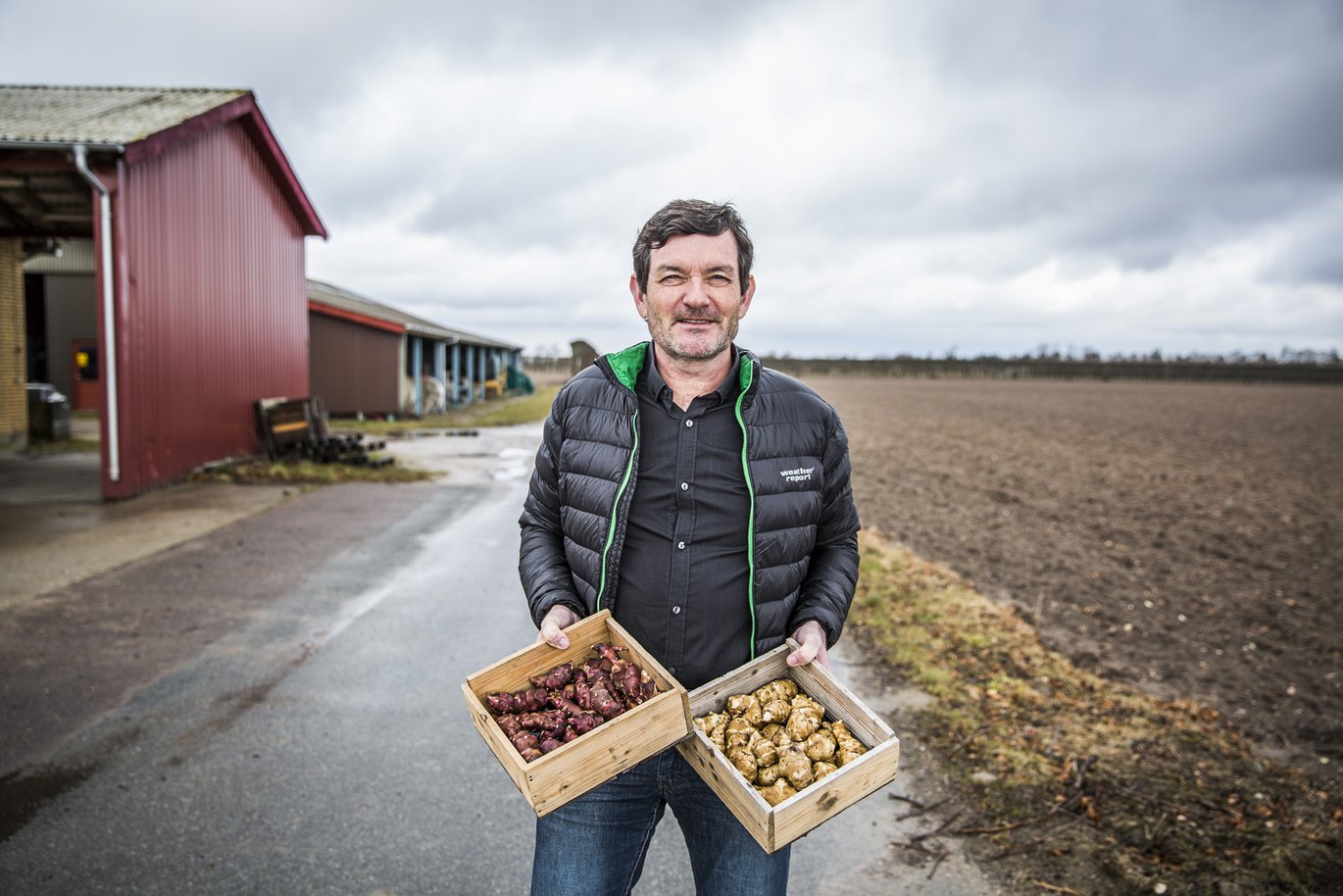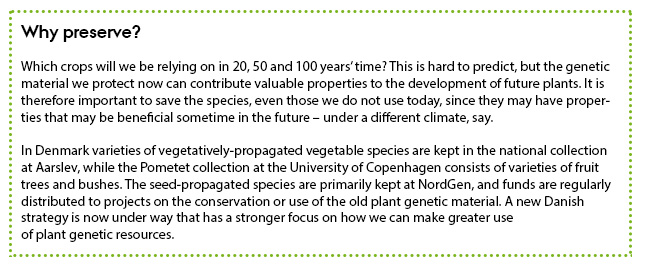Growing interest in vintage varieties
There is a growing interest in old varieties of fruit, vegetables and cereals. This is the experience at both the Nordic Gene Bank (NordGen) and Aarhus University’s horticultural research site in Aarslev who administer the national collection of vegetatively-propagated vegetables.

Aarhus University’s research station in Aarslev is responsible for maintaining the national collection of a number of vintage varieties of vegetables that are not propagated by seed. This means that they must be preserved as growing plants in the soil.
These old varieties represent a large diversity, and often have characteristics that differ from newer cultivars. They may be more resistant to diseases, tolerant to drought and high temperatures or have properties beneficial for human health. It is therefore important that they are preserved, both for the sake of diversity, but also so that they can be included in future breeding programmes.
The collection at Aarslev numbers 51 different horseradish clones, 78 variants of rhubarb, 18 clones of Jerusalem artichoke and 28 varieties of shallots. The collection additionally boasts 41 varieties of hops. It is constant work preserving and maintaining the collection – it has to be regularly renewed and planted out and the different varieties of, for example, Jerusalem artichoke have to be kept separate in order that they do not get mixed up.
You can acquire plants of the vintage varieties supplied both as a commercial enterprise and as a hobby breeder; some of the varieties of hops originating from Funen are, for instance, used in beer brewing at some of the local breweries. Lars Henrik Jacobsen, research assistant at the Department of Food Science and who manages the collection, says that there is great interest in the old varieties:
- People can normally get only one or two varieties in the supermarket and are often astonished when they see that Jerusalem artichokes, for example, are available in a number of completely different sizes and colours.The collection is not just for the decoration and pride of future generations, says Lars Henrik Jacobsen:
- We are constantly trying to get the collections included in cultivation experiments so that we can get the material out to work.
Run on seeds – new strategy in the pipeline
The seed-propagated species are kept at NordGen who will also supply small samples of the stored seeds to researchers, breeders and hobby breeders. NordGen has seen a large increase in interest in recent years, which is resource-demanding both in terms of propagation of the seed material and handling of the many enquiries.
In the past 15 years, Denmark has prepared strategies, action plans and awarded project funds to stimulate activities in the area, but the actual storage and maintenance of preservation-worthy seeds takes place at NordGen. The advisory committee for plant genetic resources at the Danish AgriFish Agency is currently working on a new Danish strategy for the area.
The chairman of the committee is Birte Boelt, senior researcher at the Department of Agroecology at Aarhus University. She clarifies:
- In the committee we are working on a model where we divide the crops according to how widely used they are. One group consists of the main agricultural crops that undergo commercial breeding in Denmark. This group is well described and regulated and the varieties sold commercially. Then there are the smaller species that are not commercially bred in Denmark. For some of these, there is a growing commercial interest – for example, in relation to the New Nordic Food concept – and, finally, there are seeds for private individuals. In future we would like to ensure the continued development within all three areas.
Vintage varieties to the fore
Seeds for commercial use are covered by EU legislation on seeds, while private individuals can swap seeds for non-commercial use. And the private realm is not unimportant in the work on describing vintage varieties since there is a great deal of interest in them among private individuals. This is felt, for example, in the association Frøsamlerne (“seed collectors”) which organizes seed-swapping days throughout the country.
MOVE (Marketing of Organic Vintage plant material) is a new project that focuses on making old vegetable varieties available to organic growers. The project works with cabbage, beetroot and spinach. Project manager Lise Christina Deleuran, Senior Adviser at the Department of Agroecology, explains:
- Many of the old varieties can have properties that have been bred out in the modern varieties, such as bitter compounds in cabbage. But bitter compounds have been shown to have health benefits. It is important to note, however, that older varieties are not necessarily better than the newer varieties. If the old varieties are to be used commercially, there is a need for larger seed quantities that meet the requirements for purity and quality.
Further information
Birte Boelt
Department of Agroecology, Aarhus University
M birte.boelt@agro.au.dk
T 22283328
Lise Christina Deleuran
Department of Agroecology, Aarhus University
M lise.deleuran@agro.au.dk
T 4587158278
The project MOVE (Marketing of Organic VintagE plant material) is part of the Organic RDD 2.2 programme, coordinated by ICROFS (International Centre for Research in Organic Food Systems). The project is funded via the Green Development and Demonstration Programme (GUDP) under the Ministry of Environment and Food.
